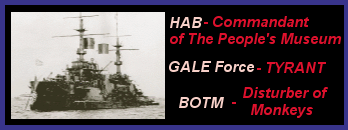I downloaded the PDF version of this ages ago and only fully read it now.
To sum up the most interesting points of his theory:
Maurer tells that most feudal aristocratic societies are born as a measure to spread food from the producers to non-food producers that still do something productive (priests and the aristocratic warriors protecting them). However, there comes a point where food distribution is taken away from aristocratic hands and into oligarchic hands. Oligarchic leaders do mix with the aristocracy as they have the most powerful thing in a market-based society: wealth. Thus a period of oligarchic society appears.
The next thing is that people do grow tired of their oligarchic overlords. This is do that in an oligarchic society the middle class can grow and form itself to the point where there is a demand for social change. Or in his words:
This is where the interesting tidbits come in:As wealth spreads through the population so does political influence. Electoral politics begins to develop into a meaningful mechanism for sharing power. At some point the politicians realize that they must represent everyone, rich and poor alike. When this happens, the country is ready to change from oligarchic to democratic market society.
Maurer writes that this transition is not simple or easy. There are always problems getting in the way, usually the oligarchs. If they feel threatened, they will entrench their position. If elections are ran, competitors will appeal to the oligarchs for they have money to run the election.
When a status que continues and the problems of the working class still goes on. Low wages, unequal justice system, the clear signs of exploitation, etc.
So, people want an alternative. Thus communism, socialism, fascism and Arab fundamentalism enter the mix.
Maurer argues that all of these, aside from being ineffectual in terms of distribution and creation of wealth, are actually temporary states. They are able to overthrow the oligarchic system by moving the masses but are incapable of creating a sufficient alternative.
The only working system is representative market democracy, as this creates more and more wealth. Even the poor have significantly high standards of living. Maurer gives a list of criteria of what these should be.
And that's pretty much it. He also gives some analysis on the Middle East and what is "wrong with it". From what I gather, he states that the creation of Israel was a mistake (or at least, an event that has polarised nations in that area against the USA) as well as badly-thought out foreign policy. He names the USA, well, I think I should quote here:
In sum, I am posting this because I would like to see this from the perspective of forum members. I myself have difficulty finding flaws in the man's arguments and I find them rational, if a bit simplistic.The United States was the third modern nation-state. It still holds the world record for the most acts of ethnic cleansing perpetrated over the longest period of time. For two and a half centuries, from the 1630s to the 1890s, European colonists to North America evicted the native Indian tribes from their homes and forced them westward. As the settlers pushed west themselves, the Indians were cleansed again and again. Some of the most worthless land in the west was set aside for their use as Indian Reservations. Most reservations were little more than death camps where Indians were sent to starve.

